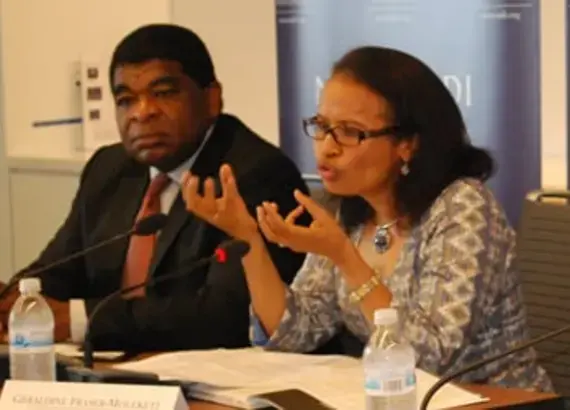
Success Story
Global Parliamentary Report Analyzes Changing Relationship Between Constituents and Representatives
The evolving relationship between citizens and their representatives is the featured subject of a new Global Parliamentary Report, a joint effort by the Inter-Parliamentary Union (IPU) and the United Nations Development Programme (UNDP). The report, which aims to help parliaments, politicians and parliamentary staff fulfill their representative role, was the subject of a panel discussion at NDI on July 17.
The report examines how citizens’ expectations of representative institutions are changing and the steps that parliaments are taking to respond to citizens’ needs. The report draws on the experiences of parliaments, individual politicians and civic organizations that support and monitor parliamentary work to illustrate the challenges that parliaments face.
“If parliaments don’t fulfill their special role, the entire democratic system is placed in jeopardy,” said NDI President Kenneth Wollack, who delivered opening remarks at the panel, entitled “The Global Parliamentary Report: The Changing Nature of Parliamentary Representation.”
Panel participants were Greg Power, a parliamentary specialist and the report’s lead author; Martin Chungong, director of the division of programs for the IPU; Geraldine Fraser-Moleketi, democratic governance practice director for UNDP; and Sarah Mendelson, deputy assistant administrator for the Bureau of Democracy, Conflict and Humanitarian Assistance at the U.S. Agency for International Development. Thomas Carothers, vice president for studies at the Carnegie Endowment for International Peace, moderated. NDI’s governance program director, Scott Hubli, served as an advisor to the project.
Though public trust in parliaments around the world is low, participants acknowledged that parliaments remain essential to democracy. Chungong suggested that the report “seeks to shed light on the increasing lack of trust in [representative] institutions.” Still, citizens are placing increasing demands on their parliaments, which Frazer-Moleketi interpreted as an indication of their interest in engaging in the parliamentary process.
Power added that parliamentary efforts to meet citizen needs may be fueling heightened expectations and increasing citizens’ demands. But rather than treating these on a case-by-case basis, he said parliamentarians need to find broader solutions that will help larger segments of the population. A parliamentarian from Bangladesh, for example, has run a microfinance system out of his constituency office as a response to financial requests from his constituents.
New developments in communications technology as well as the growth of parliamentary monitoring organizations (PMOs) have contributed to increased public demand for information and influence in the parliamentary process, more accountability from MPs and better constituent services.
Invoking the Open Government Partnership,an international initiative to promote government transparency and accountability, Mendelson said that the development of new technologies that make government more transparent and participatory is essential. The technologies should not only amplify citizens’ voices, but help parliamentarians use citizens’ input more effectively. Power stressed that citizens’ efforts to hold parliamentarians accountable might result in so many restrictions that they could become “delegates” bound to operate solely based on the opinions of their constituents, possibly relinquishing the ability to serve the national interest.
“This report will hopefully become a worldwide reference point for promoting good practice in parliamentary development,” said Fraser-Moleketi. “It doesn’t need to promote any specific parliamentary system, but it’s there to disseminate what is good and innovative from various regions of the world.”
Related:
Published July 26, 2012
